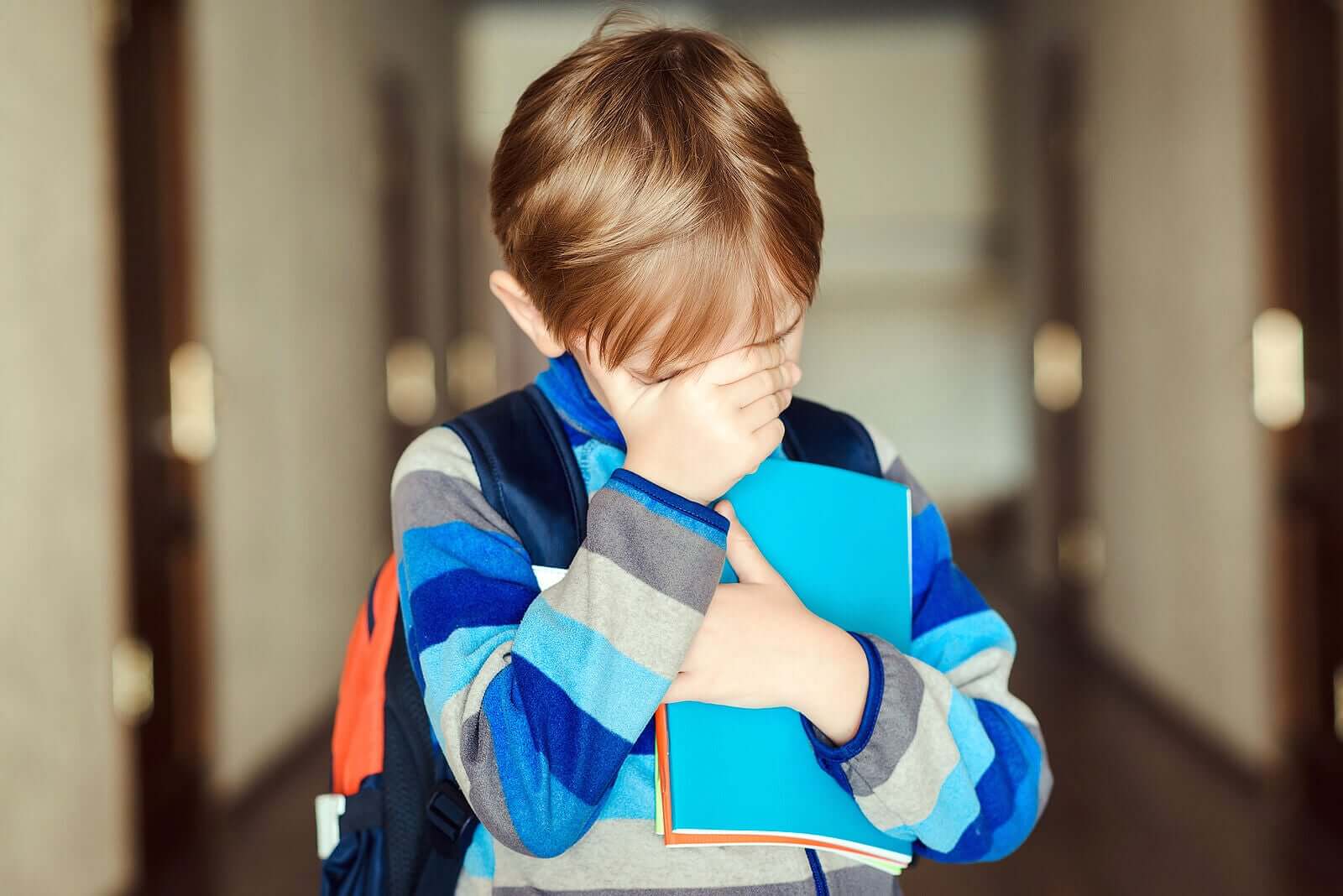6 Tips to Help Children Deal with Rejection


Written and verified by the psychologist Mara Amor López
How can we help children deal with rejection? Unfortunately, many children and teenagers feel rejected. In most cases, they feel they’re different from their peers, friends and family. This difference may be physical, oral, emotional or intellectual.
Children who get excellent grades at school, are physically different or like to dress in a peculiar way, etc., are often ignored or rejected from their school mates or friends. However, certain children don’t have any of these characteristics and feel rejected, too.
Short-term effects
The rejection that children suffer from their peers may affect their psychological well-being, because rejection is stressful for children. Thus, some of the effects rejection can cause are:
- Anger and irritability.
- Negative self perception.
- Anxiety and depression symptoms.
- Psychosomatic pain (headache, stomachache, insomnia).
- Problems relating to others.
- Social withdrawal.
- Interest loss and lack of energy.
- Concentration and attention problems.
- Learning and school problems.
- Inability to enjoy what they have.
- Self-esteem issues.

Tips to help children deal with rejection
If you suspect that your children are suffering from rejection, you can help them overcome this situation. Next, we’ll give you some tips.
Tell them that they should never seek someone’s approval or friendship
It’s important that you find the right words to tell them that if a friend or a classmate doesn’t want to be with them, they shouldn’t insist on that friendship.
If their peers don’t accept your children for who they are, they don’t deserve their friendship. And, your children will definitely find another group of people to be with, who may share their same interests.
Promote communication to help children deal with rejection
To understand how they feel, you need to talk to them and listen to what they have to say. However, you shouldn’t treat them as victims, and they shouldn’t feel that there’s no solution to their problem.
For example, if someone doesn’t invite them to a birthday party, you must tell them that there’ll be others. The important thing is that they understand and express their feelings, in case it happens again.
Work on their social skills
In many occasions, children don’t know how to relate to others. Sometimes, they’re shy or they just don’t know how to do it.
For this reason, it’s important to work on social skills that would help them relate to others. And, pay special attention to difficult situations which may require problem solutions. In those cases, you need to explain the importance of assertiveness and self control, etc.
Help children deal with rejection by strengthening their self-esteem
Rejection damages self-esteem. So, when children get rejected, they compare themselves to others and feel inferior. Thus, it’s essential to work on their self-esteem.
So, you need to make them understand that rejection isn’t that important, because they’re not alone. They have a family that cares for them and they’ll get the chance to make new friends.
Another thing they need to understand is that it’s not their fault. Sometimes, other kids are just different from them and don’t share their same interests. The solution is to find children who share their same tastes, which is very likely to happen.
Talk to someone at school and ask for their help
Since parents aren’t at school, we don’t know exactly what happens there. That’s why you should talk to their teachers and ask for their version of the facts.

If all the tips we’ve mentioned above don’t make the situation better, talk to their teachers. Ask them what happens at school and if they’ve seen something that may imply that your children have been rejected.
If necessary, ask them to talk to other parents in order to solve this problem. And, in case your children have lowered their performance, teachers should help them, too.
Ask for professional help, if necessary
If you notice that your children are having a really bad time, if they’re sad all the time or have lost interest in everything that surrounds them, ask for professional help. A professional may help them by working on the necessary skills to overcome this situation. Thus, they’ll be ready in case the rejection repeats.
In conclusion, even though sometimes they’re not enough, these tips may help children deal with rejection. At times, rejection may turn into bullying. So, you need to be aware of that possibility.
If, as parents, we don’t know how to act in this type of situation, these tips may be of great help. And, if necessary, remember to visit a mental health professional, who’ll help you and your children.
How can we help children deal with rejection? Unfortunately, many children and teenagers feel rejected. In most cases, they feel they’re different from their peers, friends and family. This difference may be physical, oral, emotional or intellectual.
Children who get excellent grades at school, are physically different or like to dress in a peculiar way, etc., are often ignored or rejected from their school mates or friends. However, certain children don’t have any of these characteristics and feel rejected, too.
Short-term effects
The rejection that children suffer from their peers may affect their psychological well-being, because rejection is stressful for children. Thus, some of the effects rejection can cause are:
- Anger and irritability.
- Negative self perception.
- Anxiety and depression symptoms.
- Psychosomatic pain (headache, stomachache, insomnia).
- Problems relating to others.
- Social withdrawal.
- Interest loss and lack of energy.
- Concentration and attention problems.
- Learning and school problems.
- Inability to enjoy what they have.
- Self-esteem issues.

Tips to help children deal with rejection
If you suspect that your children are suffering from rejection, you can help them overcome this situation. Next, we’ll give you some tips.
Tell them that they should never seek someone’s approval or friendship
It’s important that you find the right words to tell them that if a friend or a classmate doesn’t want to be with them, they shouldn’t insist on that friendship.
If their peers don’t accept your children for who they are, they don’t deserve their friendship. And, your children will definitely find another group of people to be with, who may share their same interests.
Promote communication to help children deal with rejection
To understand how they feel, you need to talk to them and listen to what they have to say. However, you shouldn’t treat them as victims, and they shouldn’t feel that there’s no solution to their problem.
For example, if someone doesn’t invite them to a birthday party, you must tell them that there’ll be others. The important thing is that they understand and express their feelings, in case it happens again.
Work on their social skills
In many occasions, children don’t know how to relate to others. Sometimes, they’re shy or they just don’t know how to do it.
For this reason, it’s important to work on social skills that would help them relate to others. And, pay special attention to difficult situations which may require problem solutions. In those cases, you need to explain the importance of assertiveness and self control, etc.
Help children deal with rejection by strengthening their self-esteem
Rejection damages self-esteem. So, when children get rejected, they compare themselves to others and feel inferior. Thus, it’s essential to work on their self-esteem.
So, you need to make them understand that rejection isn’t that important, because they’re not alone. They have a family that cares for them and they’ll get the chance to make new friends.
Another thing they need to understand is that it’s not their fault. Sometimes, other kids are just different from them and don’t share their same interests. The solution is to find children who share their same tastes, which is very likely to happen.
Talk to someone at school and ask for their help
Since parents aren’t at school, we don’t know exactly what happens there. That’s why you should talk to their teachers and ask for their version of the facts.

If all the tips we’ve mentioned above don’t make the situation better, talk to their teachers. Ask them what happens at school and if they’ve seen something that may imply that your children have been rejected.
If necessary, ask them to talk to other parents in order to solve this problem. And, in case your children have lowered their performance, teachers should help them, too.
Ask for professional help, if necessary
If you notice that your children are having a really bad time, if they’re sad all the time or have lost interest in everything that surrounds them, ask for professional help. A professional may help them by working on the necessary skills to overcome this situation. Thus, they’ll be ready in case the rejection repeats.
In conclusion, even though sometimes they’re not enough, these tips may help children deal with rejection. At times, rejection may turn into bullying. So, you need to be aware of that possibility.
If, as parents, we don’t know how to act in this type of situation, these tips may be of great help. And, if necessary, remember to visit a mental health professional, who’ll help you and your children.
All cited sources were thoroughly reviewed by our team to ensure their quality, reliability, currency, and validity. The bibliography of this article was considered reliable and of academic or scientific accuracy.
- Górriz, A. B., Villanueva, L., & Clemente, R. A. (2009). Comprensión de la mente y habilidades comunicativas en niños rechazados por sus iguales. Infancia y Aprendizaje, 32(1), 17-32.
- Bacete, F. J. G., Barreda, A. R., Rojas, I. M., & Perrin, G. M. (2013). El aprendizaje de la amistad en la Educación Primaria. Un procedimiento intensivo para ayudar a los niños rechazados a hacer amigos. Apuntes de Psicología, 31(2), 155-163. http://apuntesdepsicologia.es/index.php/revista/article/view/318
- Andrés, M. D. R. A. (2013). Intervención socioemocional en alumnado rechazado de primer curso de Educación Primaria (Doctoral dissertation, Universidad de Valladolid). https://dialnet.unirioja.es/servlet/tesis?codigo=138168
This text is provided for informational purposes only and does not replace consultation with a professional. If in doubt, consult your specialist.








